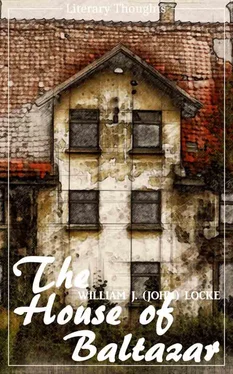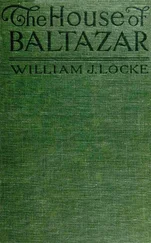The next day, in the grounds of Churton Towers, the young man, returning to his father’s fascinating mystery, propounded the dilemma that had kept her from sleep the night before, and he, in his turn, asked: “Why?”
“The only solution of it is,” said he, “that he burned the house down in order to roast the pig.”
She flashed a glance at him. “You seem to know him better than I.”
At that moment, John Baltazar, about whom there was all this coil, leaning over the gate of a derelict and remote moorland farmstead, perhaps asked himself the same question; for in moments of intellectual and physical relaxation he was wont, like most solitaries, to look down the vista of his years.
A low granite wall, in which was set the wooden gate, encircled the few acres of his domain. Behind him, a one-storied, granite-built, thatched dwelling and the adjoining stable and byre and pigsties and dismantled dairy. Surrounding the buildings, with little selection as to appropriateness of site, were flower garden, mostly of herbaceous plants, vegetable garden, wire-enclosed poultry runs variegated with White Wyandottes and Rhode Island Reds, and half an acre of rough grass on which some goats were tethered.
John Baltazar leaned over the gate and, smoking his cherry-wood pipe, gazed with the outer eye on the familiar scene of desolate beauty. Within his horizon he was the only visible human being, his the only human habitation. All around him spread the rolling landscape of granite and heather and wind-torn shrub. The granite hills, some surmounted by gigantic and shapeless masses of rock left freakishly behind in glacial movements of unknown times, glowed amethyst and pale coral; the heather slopes in the sunlight blazed in the riot of royal purple, and the shadowed plains lay in a sullen majesty of gloom. Heather and granite, granite and heather, moorland and mountain, beauty and barrenness. God and granite and heather. No place for man. No more a place for man than the Sahara. For man, to his infinite despair, had tried it; had built the rude farmstead, had, Heaven knows why—perhaps through pathetic pride of ownership—with infinite sweating, piled up the three-foot ring of stones, had sought to cultivate the illusory covering of earth, had dug till his sinews cracked and turned up the eternal granite instead of clods, and had sickened and starved and died; and had abandoned the stricken place to the unhelpful sun and the piercing winds and the snows—and to John Baltazar, who now, smoking his pipe, formed part of this tableland of desolation.
Fifty, he looked ten years younger. A short, uncombed thatch of coarse brown hair showed no streak of grey; nor did a closely clipped moustache of a lighter shade. His broad forehead was singularly serene, save for an accusing deep vertical line between the brows. And a faint criss-cross network, too, appeared beneath the strong grey eyes when they were dimmed by relaxation of effort, but vanished almost magically when they were illuminated by thought. A grey sweater, somewhat tightly fitting, revealed a powerful frame. Knicker-bockers and woollen stockings and heavy shoes completed his attire. His hands, glazed and coarsened, at first sight betrayed the labourer rather than the scholar. But the fingers were sensitively long, and the deep filbert nails showed signs of personal fastidiousness, as did his closely shaven cheek.
A wiry-coated Airedale came to him and sought his notice. He turned and caressed the dog’s rough head.
“Well, old son, finished the day’s work? You’re a rotten old fraud, you know, pretending to be bossing around, and never doing a hand’s turn for anybody.”
The dog, as though to justify his existence, barked, darted a yard away, ran up, barked again and once more started.
“Dinner time already?”
The sound of the word signified to the dog the achievement of his mission. He barked and leaped joyously as his master slowly strolled towards the house. On the threshold appeared a young Chinaman, of smiling but dignified demeanour, wearing Chinese dress.
“Dinner is served, sir,” he said, making way respectfully for Baltazar to pass.
“So Brutus has just informed me, Quong Ho.”
“I sent him to tell you, sir. He is possessed of almost human understanding.”
“It is always good,” said Baltazar, “to associate with intelligent beings.”
He entered the house-piece, the one large living room of the building, and took his place at a small table by a western window, simply but elegantly set with clean cloth and napkin, shining silver and glass, and a little bowl of roses placed on a strip of blue-and-gold Chinese embroidery. It was a room, at the first glance, of characterless muddle; at the second, of studied order. A long, narrow room, built north and south, with two windows on the west side and two on the east. An old-fashioned cooking range stretched beneath the great chimney-piece that took up most of the northern end, for the room was rudely planned as kitchen and dining-room and parlour and boudoir, all combined, and hams in the brief days of its prosperity had hung from its rafters. The spaces on the distempered walls not occupied by unpainted deal bookshelves were filled with long silken rolls of Chinese paintings. Turkey carpets covered the stone floor. Nearly the whole length of the eastern wall ran a long deal table, piled with manuscripts and pamphlets, but with a clear writing space by the north-east window, at which stood a comfortably cushioned writing chair. A settee and an arm-chair by the chimney corner, an old oak chest of drawers that seemed to wonder what it did in that galley, a bamboo occasional table and the little dining table by the south-western window completed the furniture. But the room was spotlessly clean. Everything that could shine shone. Every pile of papers on the long deal table was squared with mathematical precision.
The young Chinaman served the dinner which he had prepared—curried eggs, roast chicken, goat’s milk cheese—with the deftness of long training. He paused, expectant, with an unstoppered decanter.
“Burgundy, sir?”
“No, thank you.”
Quong Ho filled a tumbler with water.
“How long has that half-bottle of wine been opened?”
“If I remember accurately, sir, this is the fifteenth day.”
“It’s not fit to drink, Quong Ho. To-morrow you will throw it away and open another half-bottle.”
“It shall be done as you wish, sir,” said Quong Ho. “Except, sir, that I do not propose to waste the wine, for though it is too stale for drinking purposes, it is an invaluable adjunctive in cookery for soups and sauces.”
Baltazar drank a draught of water and, wiping his lips, looked over his shoulder at the Chinaman.
“Adjunctive? That’s a new word. Where did you get hold of it?”
“Possibly from you, sir, who have been my master in the English language for the last ten years.”
“You didn’t get it from me. It’s a beast of a word.”
“Then possibly, sir, I have met it in my independent reading. Perhaps in The Rambler of your celebrated philosopher, Johnson, which I have been perusing lately with great interest.”
Baltazar leaned back in his chair.
“Quong Ho,” said he, “you’re a gem. A gem of purest ray serene——”
“The words I recognize as those of Poet Gray,” said Quong Ho.
“That is true,” said Baltazar. “But destiny, as far as I have the handling of things, won’t condemn you to a vast unfathomed cave of ocean. What I tried to imply was, that you’re a wonderful fellow—what the Americans in their fruity idiom which I haven’t yet taught you, call a peach.”
“I will make a mental note of it, sir,” said Quong Ho.
Baltazar grinned over his plate and went on with his dinner, the dog Brutus by his side watching the process with well-bred yearning and accepting an occasional mouthful with a gluttony politely concealed. Towards the close of the meal Quong Ho brought in lamps and candles—Baltazar loved vivid illumination—and drew the curtains. In the house Quong Ho wore Chinese slippers and walked like a ghost. He began to clear away as soon as Baltazar rose from the table. The latter filled and lit his pipe and consulted his watch.
Читать дальше












